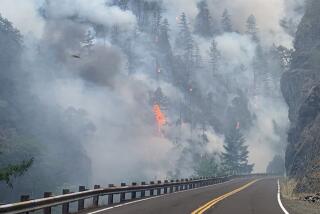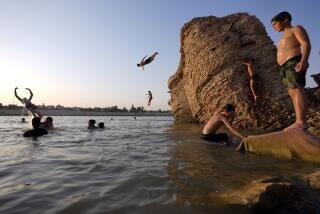Water and Power Restored to Much of Iraq’s Capital
- Share via
BAGHDAD — About half of Baghdad’s electricity requirements are being met, but increasing needs in the summer will tax the power system, U.S. officials said Saturday.
U.S. Brig. Gen. Steve Hawkins said at a news conference that priority for Baghdad’s limited power supply was being given to water pumping plants, hospitals and sewage plants, followed by residential areas and industries.
Hawkins said 75% of the east side of Baghdad and about 25% of the west had power Saturday. He said officials were trying to improve the distribution.
He said that 65% to 70% of the city had water and that all water pumping stations were working, albeit with some breaks in the lines from bombing.
Of the 12 public hospitals in Baghdad, 11 had water and power, he said, while all 26 sewage plants did.
Hawkins said that at this time of year, Baghdad usually requires 1,000 megawatts of electricity. The power grid is producing about 450 to 500 megawatts.
“When the summer cooling season comes, we’ll need about 2,500 megawatts,” he said.
Hawkins said it would be weeks before Baghdad’s second power system is up and running.
Some Iraqi electrical workers who have returned to their jobs have received a one-time $20 emergency payout from the Americans, pulled from frozen Iraqi assets.
“We developed a list of who’s rolling up their sleeves and helping them get the power back on,” Hawkins said. U.S. officials said longer-term payment issues still had to be worked out. He didn’t say how many people had received the payments.
An Iraqi power engineer working with the Americans, Ihsan Obeidi, estimated that about half of Iraq’s 40,000 electricity commission workers were on the job.
U.S. officials said communications remained severely disrupted -- even for the U.S. military -- and that Iraqis had no clear picture of who was in charge in the capital.
“We do realize there is tremendous confusion that needs to be clarified.... Over the next few days, things will become more clear,” said Maj. Gen. Carl Strock, the senior engineer working for retired Army Lt. Gen. Jay Garner, the U.S. civil administrator.
Gary Vogler, a senior oil advisor working for Garner, said northern Iraq and Baghdad had adequate supplies of refined fuel products supplied by the Doura refinery outside Baghdad and the Baiji refinery 112 miles north of the capital.
Vogler said the Basra refinery should start up within a week; failing that, fuel would be imported from Kuwait and other Persian Gulf countries.
Of Iraq’s normal daily consumption of about 4 million gallons of gasoline, Hawkins said, Doura was supplying about 800,000 gallons and Baiji 2 million.
“So we are well over 60% of their gasoline needs,” he said.
More to Read
Sign up for Essential California
The most important California stories and recommendations in your inbox every morning.
You may occasionally receive promotional content from the Los Angeles Times.










